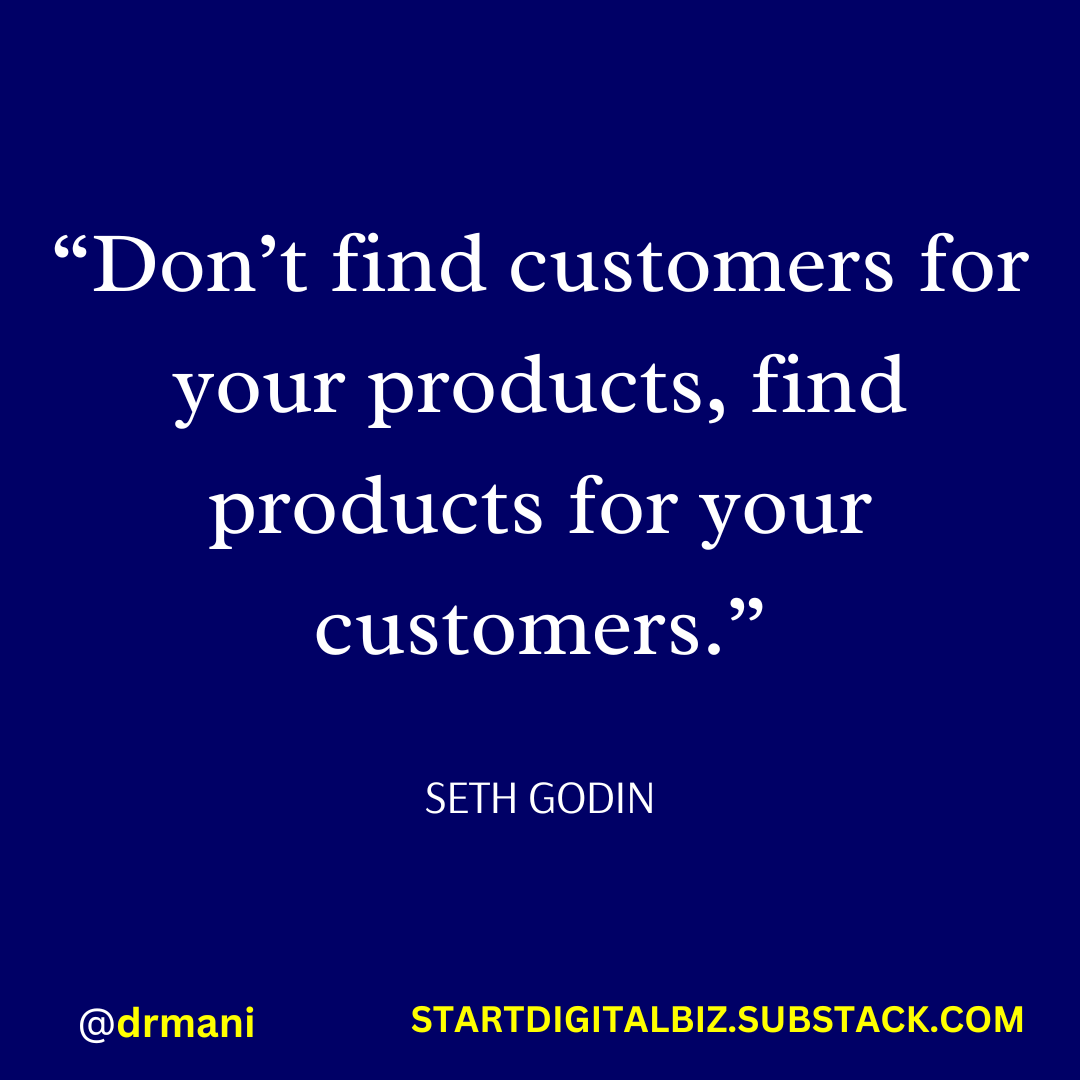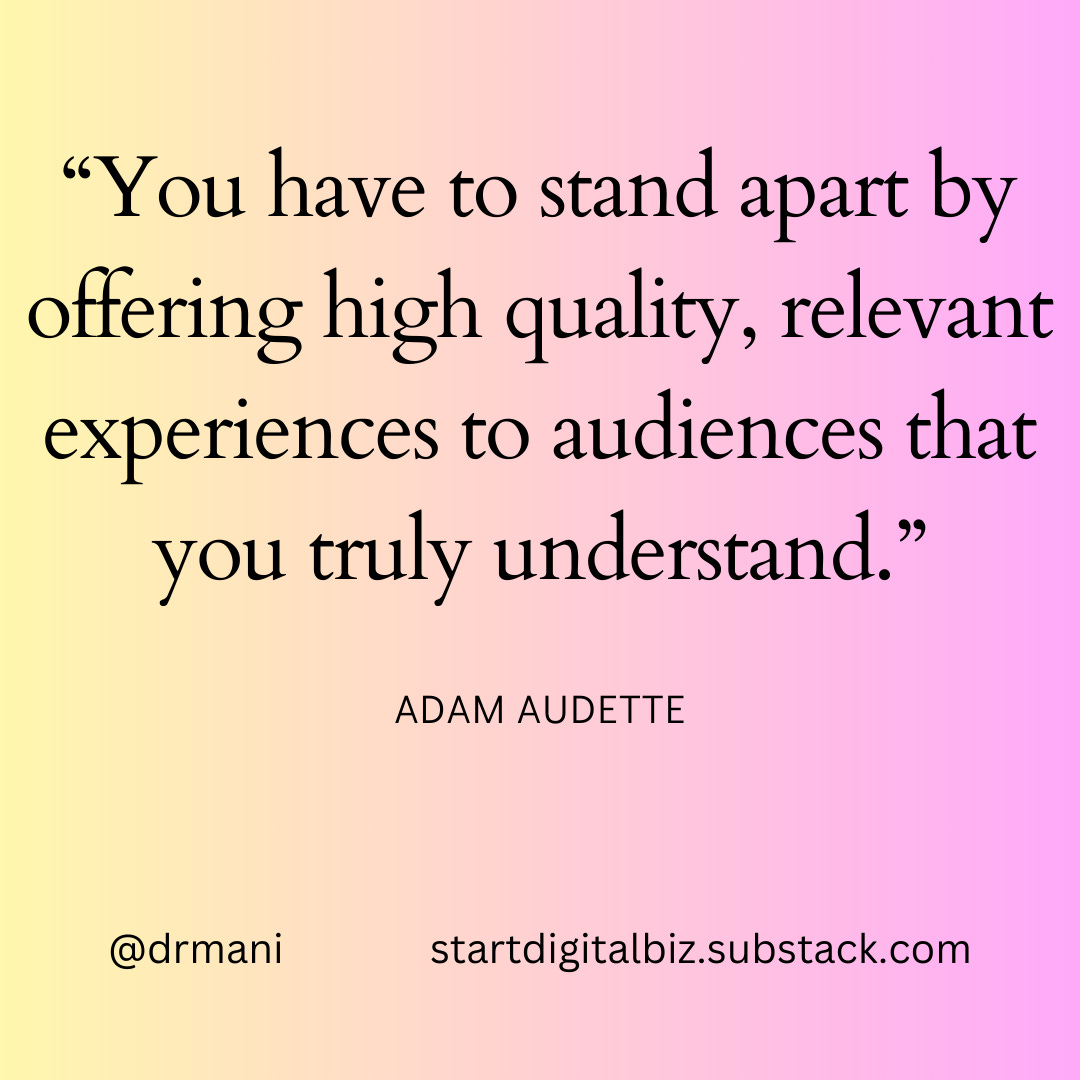We now arrive at one of the most critical steps in how to start a digital business… identifying your niche market and audience.
If your digital business targets everyone, then it actually targets nobody!
Yes. That's a classic rookie mistake.
"Who will buy your book?" I ask a new wanna-be author.
"Why, everyone!" s/he replies.
I smile.
That isn't how things work in the real world. Because it's impossible to create anything that will thrill and delight every consumer.
Be it
the solution to a vexing problem, or
a must-have thingamajig, or
a 'do-it-all-for-you' widget, or
even an essential service
... one size will never fit all.
So one of the key early decisions you'll have to make about your digital business is to determine WHO you will serve.
Let’s talk about it.
HOW TO START A DIGITAL BUSINESS : TABLE OF CONTENTS
This report is part of a collection that covers all aspects of how to start a digital business online. To see others in the series, explore the links below:
Choose a niche within a broader market. One for which your offer is an ideal, near-perfect match. And then you'll have no trouble selling it to your audience.
That's why I'll begin with these principles of finding your ideal niche - before getting into the nuts and bolts of tools and technique.
And it's the same as with any other 'research phase' in how to start a digital business. You'll begin the hunt for a niche by asking yourself questions.
But... the 'right' questions.
So what are they?
Let's start with the most basic.
Want to save this article? Download this post as a PDF - CLICK HERE
What Is A Niche?
Niches are narrow interest-areas... about a topic, a hobby, or a subject that a certain group of people find deeply fascinating or incredibly useful.
There are as many "niche markets" as there are people!
Some niches are large. Others are small. Few are really tiny.
To be called a 'niche', though, it should span a narrowly focused area of interest. A speciality or zone of expertise.
For example:
Cooking is a pretty broad interest area. Within that, Southern cooking is a niche. How to cook Southern sea-food is a sub-niche of this one.
Or take Health and Fitness. It's a wide zone of interest. Men's health is a niche inside it. Body building for men is a sub-niche of this group.
You get the idea?
You can go as deep and narrow as you like.
DON’T MISS:
4 Principles of How To Find Your Niche
It's important to realize that there are no 'perfect niches' to hunt out.
What matters is how well your niche is targeted to the goals of your digital business.
And to uncover that match, the critical questions to ask yourself as you try to define a niche for your digital information product business are these:
Is the niche big enough?
Is the niche profitable?
Is the niche easily targeted and reached?
Is the niche scalable?
We'll explore each of these important issues in more detail next.
Bonus: Click Here to Download "How to Find Your Niche" as a PDF file
1. Is The Niche BIG Enough?
Are there enough people looking for the solution you plan to offer?
Maybe the product or service you intend to sell in your digital business online is a fantastic match - for a specific type of buyer.
But unless there are enough of those buyers, your profit potential will always be limited.
That's why you cannot afford to go after a niche that's too small or too limited - because once you've saturated that audience with your ads, or successfully sold them your products...
You're done!
Unless you can come up with many more things they crave badly, and can sell them on all of these things every single time, you will set a cap on how big your digital business can grow.
But if there are enough prospective shoppers in your interest area, then you can expect your client-base to constantly grow as you serve it better. And once word spreads from your delighted buyers about the quality and value of your digital business, new prospects will flock to you.
The downside of a larger niche market is that it is likely to already have established players - and so you'll face competition. That makes it a little harder to establish your business as a viable choice.
Still, if you're in a completely competition-free niche, beware!
It could mean you're lucky (or a genius!) for identifying a brand new field. But it's more likely that the niche is too tiny to be profitable. Which is why you don't see anyone else competing! 😳
In a sense, it's like looking for a good restaurant in a new neighborhood. The best ones already have some people dining. The empty ones are probably not very good!
2. Is The Niche PROFITABLE?
Do the prospects in your intended niche market have money? And are they willing to spend it on your solution?
Knowing this is critical to the success of your digital business.
Because you cannot run a profitable business if the target market you serve doesn't have money to spend on value.
Or won't spend it… for any reason.
So how can you tell if your ideal prospects actually buy stuff?
You cannot simply go out and ask each of them. Or conduct a survey that asks: "How rich are you? What's your budget for shopping?"
Well, you could. But the chance you'll get a helpful response is low.
But a good indirect clue is to watch if there are already other businesses that sell products to the same market.
Not necessarily the same things you plan to offer. But to the same people.
For instance, if you plan to offer book keeping and inventory management services to small businesses, you could see if anyone else is running ads to sell these same businesses other related services - like accounting, or tax filing, or customer-relationship management.
If your target niche has clients who spend on one solution to their problem, then it's likely they'll also purchase other solutions... just as long as they are good, valuable, and affordable.
Another hint might come from judging how passionate your prospective buyers are about this niche.
Some of the best niche markets are related to hobbies. These have folks who eat, sleep and breathe their passion.
Take golfers, for instance.
Many golfers want to own the newest and best equipment and gadgets. They'll scour every golf magazine or newsletter or guide - in search of that 'secret tip' to improve their game. A way to enhance their drive, or improve their swing, or sink long putts.
Passionate audiences will always find a way to afford the things they crave badly.
YOU MAY ALSO LIKE:
3. Is the niche easy to TARGET?
It doesn't matter how passionate or lucrative your niche market is - if you cannot reach it affordably!
Let's say your business is based in one location - but your most likely buyers are in another region or country, far far away.
Or they live and work somewhere that it's hard or impossible for you to access conveniently.
Maybe there's no single place they gather or meet, which leaves your ideal client base scattered far and wide.
Any of this would make it incredibly difficult - not to mention expensive - to reach them with news about your digital business. Or to deliver your marketing message.
That's why you should try to determine a few vital details about your best prospects, such as:
Where do they gather?
How do they interact with each other?
How can you get your marketing message in front of them?
Look for niche publications like magazines, newsletters and booklets that cater to their interests. You could run ads in them.
Hunt for special interest websites, blogs, discussion forums and Facebook Groups on the topic. You could engage people on them.
See if anyone has compiled lists of such prospects. You can rent or buy them to send out sales pitches and/or informative content.
Search for any conferences or conventions, events or meetings that your ideal audience will attend. You can be there to network and sell.
Seek out other businesses who also serve this market, and have complementary offers to your own. You can partner with them.
Many entrepreneurs get around to doing this only AFTER investing plenty of time and effort and money to start a digital business online.
And only then, sadly, they realize that their niche market is not easy to target... or at least, not affordably.
They end up spending quite a lot of money to reach them, which erodes into their margin of profit.
Sometimes, even that doesn't work well - and they fail to even match their solutions to those who face the problem!
Don't make this critical mistake in your own digital business. Look for a niche market that you can target readily, at a low cost - or even for free. Because not only will that ensure a steady flow of prospective buyers to your digital business... you'll also keep a larger share of each sale as your profit.
More money for less effort - Sounds like fun, right?
🙂
4. Is the niche SCALABLE?
What if your new digital business becomes a big hit?
Is there a way you can then grow it further within the niche?
Or can you extend it out to new sub-niches, and do it easily and economically?
Now, this might sound far out. Especially when you're just getting started. But even if you don't want to spend too long dreaming about it, take a few minutes to imagine such a future... because it could easily happen.
You might become wildly successful!
If the niche you plan to enter has multiple other avenues of potential profit...
If there are several more ways to serve your clients, deliver them more value, sell them more stuff...
If there are 'logical extensions' to your core product or service, all of which may appeal to your target market...
Then your digital business can easily grow and thrive in that niche.
On the other hand, if you go too deep into a sub-niche that it can only support a very limited range of offers - or even only one... then you cannot scale your digital business really high.
Let me explain how this idea worked in practice - with my own digital business.
The first information product I created in 1998 was about how to publish an email newsletter - and use it to grow a digital business. That was something I had first-hand experience with.
At the same time, I also realized that an entrepreneur who wants to learn about email newsletter marketing will also be curious to learn other aspects of Internet marketing. This led over the years to an extension of my infoproducts:
deeper into other aspects of publishing an ezine, and
wider into related areas of marketing like blogging, article writing, affiliate selling, SEO, copywriting and more
Know your audience - their interests and passions, their needs and aspirations. It will help you identify the perfect niche within which you can establish your digital business - and then grow it bigger.
So now that you're aware of these 4 key principles of finding the ideal niche market, it's time to determine...
Which Niche Will Make You Rich?
That's entirely up to you.
Because only you can decide which niche fits in nicely with
your proposed digital business model,
your talents and skills,
your business goals and targets, and
your passion and purpose
When all (or most) of them align, you will become unbeatable!
So how to brainstorm ideas for niche markets?
There are many ways to go about it. Let me show you just three of them.
BONUS: Click Here to Download "How to Find Your Niche" (PDF Version)
1. Look Inside Yourself
Sit in a quiet room with a sheet of paper and a pencil or pen.
Jot down a list of your interests and passions.
Think about ideas and projects that intrigued or thrilled you.
And about problems you enjoy solving.
Then list out the things you've done, stuff you've learned, books you enjoyed reading, music that moves you, activities you relish.
Any of these could be the seed of an idea for profitable niche markets to enter with your digital business.
Think about the experience and expertise you've gained through jobs you've done in the past. What skills have you acquired - that you can teach or share with others?
Look around your room. See what objects catch your eye - and are of special interest. One of them may spark off an idea for a profitable niche market to enter.
If you have a network of friends, ask them what kind of things they find fascinating. Or what problems they've wished someone would solve for them.
Write down your favorite hobbies. Then for each one, ask yourself if there's a way to turn these recreational activities into a digital business idea. Most hobbies have passionate enthusiasts willing to spend money on it.
All of this may take a bit of time and effort.
But at the end of an hour or two, you'll have a decent set of options - viable niche ideas to start your digital business online.
You can then run each idea through the filter of 4 vital niche selection principles we discussed earlier.
2. Look At Books & Newspapers
By browsing books, magazines and newspapers, you can identify some interesting niches to grow your digital business.
At a library or bookstore, look for the shelf on 'How To' books.
There are popular titles like the 'Idiot's Guide' series or the '____ For Dummies' series. In the table of contents of these books, you'll find hints to sub-niches that might be a great fit for your digital business.
Best-selling books that are 'evergreen' (ones that top the charts year after year) - e.g. on topics like job-hunting, parenting, self development and improving relationships - are another source of ideas for niche markets.
Hobbyist magazines are another place you can hunt for niche suggestions. From the content and advertisements that run in these publications, you'll get a feel for what people in each niche are looking for or desire.
Don't forget - Some savvy business owner is already spending money to run those ads... so that's a good indicator that they work, and that someone is buying whatever they sell!
Tabloid newspapers like "The National Enquirer" and "The Weekly World News" have a section of advertisements and classifieds. You'll find certain types of products being targeted at specific groups of people over and over again. These are potential niche markets that are making money for folks selling these products.
All of this can be a useful starting point to try and come up with ideas for a niche that your digital business will serve.
RECOMMENDED READING:
3. Look on Amazon
Amazon.com is the world's largest online bookstore. It is also a treasure trove for your niche research.
In each genre or category, Amazon will list the most popular book titles by sales volume. Look at the kind of topics they cover, and the sub-niches they focus on. These are potential niche markets.
The book titles and 'table of contents' can give you even more insights into the kind of readers who pick up these books. They may offer hints about the mindset and expectations of prospective shoppers in that niche.
You can even use the 'Look Inside' feature to browse a few pages of these books. You'll see what makes these books so popular - and also get ideas for digital products to offer buyers in that niche.
Amazon.com even publishes reviews by readers who have bought and read books. This can be a goldmine for niche hunting.
Going through buyer reviews will tell you what's missing or incomplete. It lets you determine the kind of products or services you can offer prospects. And reveals gaps in the market that you may be able to fill with your products or services.
Click Here to Download a PDF Version of all the articles in the "How To Build Your Digital Business - In 2024 & Beyond!" series
I hope this has given you some ideas to explore.
There are several other ways to uncover niche markets with rich potential. I go into more detail about them in one of my special reports called 'Which Niche Will Make You Rich?'
You'll find it an invaluable guide for coming up with niche ideas.
If you'd like to download and read a copy of this ebook, click here now. You'll also get 4 bonus reports that offer more tips and insights to help you identify the perfect niche market for your digital business.








